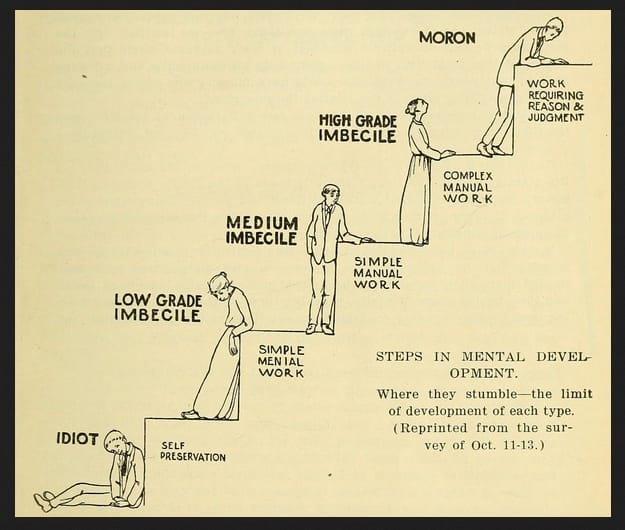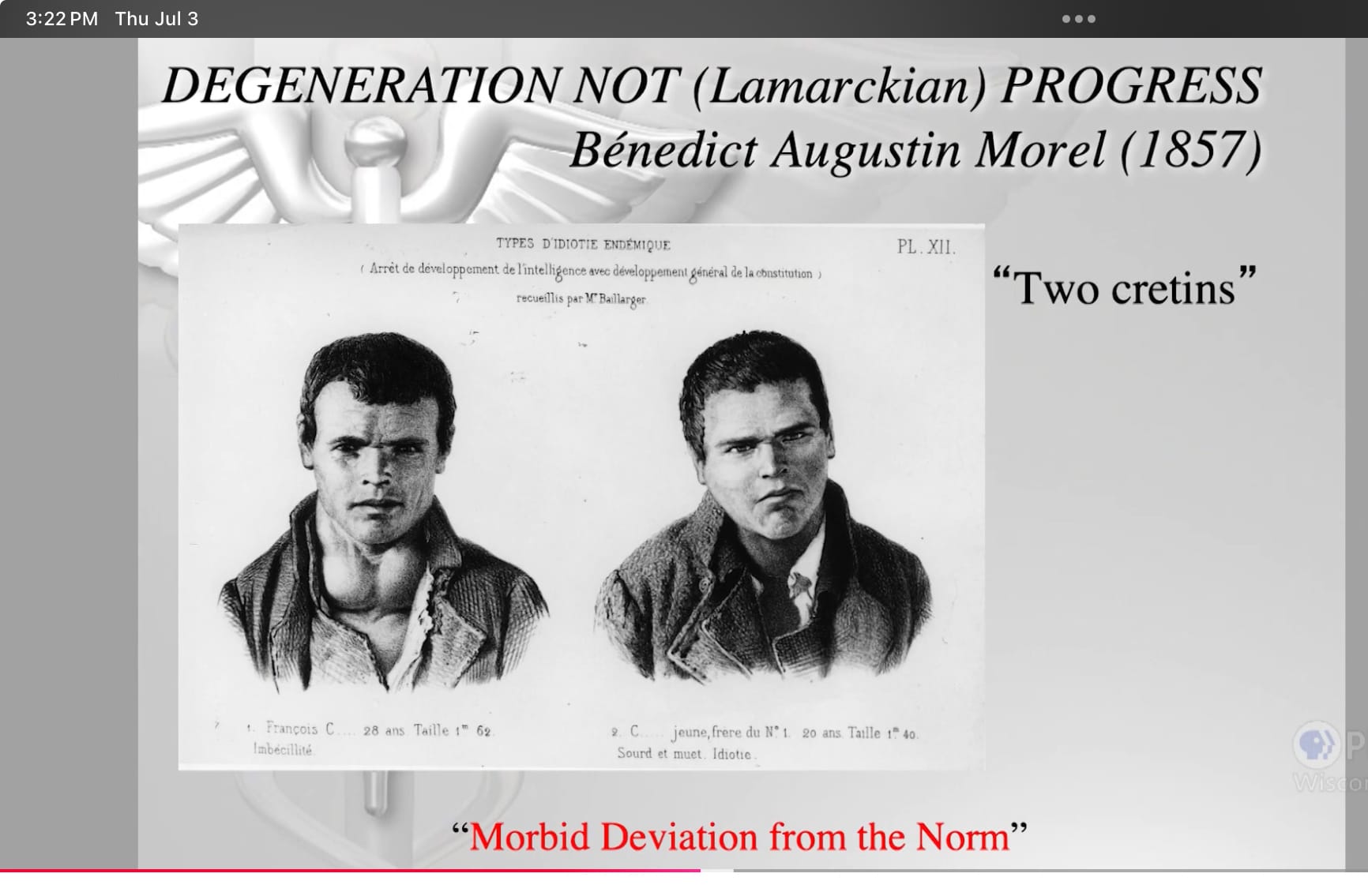Poison Words: Language, Dehumanization, and Death


Yes, this is another post related to eugenics. So many current issues involving the mistreatment of immigrants, people of color, women, and LGBTQIA people are laced with ideas that have carried over from this conceptual base. Victor Klemperer’s quote grew out of his experience of being a Jew in Nazi Germany; I will focus more on the Reich’s language—particularly about “parasites”—in a future post. I’m including it here because Klemperer’s point about language, especially repetitions of toxic terms, is also relevant to this week’s examples of eugenics language/concepts used for classifying intelligence. These reflect racist, antisemitic, and ableist beliefs.
If you’ve been following along with my discussion of throughlines from the 20th century, you’ll have seen this illustration of “mental defectives” in my post from June 20. Obviously, these labels were swept from medical and psychiatric diagnostic vocabularies a long time ago. They swept straight into the schoolyard, and everyday language—persisting so long that they spring easily to mind for the typical English speaker, who has probably never heard of Johnstone and his chart. Now they are contemptuous, commonly used against those judged as not living up to our standards of reasoning, logic, and general comprehension of the world. Most people have used these terms for someone, even if only in private or in their own thoughts. Because so many are unaware of the historical “work” these terms have done, most people are okay with their casual use. That doesn’t make that use any less ableist. And, depending on who is wielding them, racist, as we shall see later in this essay.
The invention of such categories even produced an invented word, as JoElla Straley notes: https://www.npr.org/sections/codeswitch/2014/02/10/267561895/it-took-a-eugenicist-to-come-up-with-moron. Psychologist Henry Goddard coined the term moron in the early 20th century as part of his crusade to keep those he believed were potentially criminal foreigners from entering the country. The “results” of his methods confirmed the racism of the day, as screenings conducted at Ellis Island determined that “40% of the Jews, Italians, and Hungarians tested qualified as ‘morons.’”
When “moron” and “idiot” spring to my lips—and I admit it, they sometimes do—it feels like a reflex. It’s a reflex I’m trying to take note of in myself, to better understand it. My views about intelligence-based insults arise from certain personal throughlines, which may not be widely shared. What follows are a few relevant strands I’ve been able to identify from my background. I’m curious about what may have influenced other people’s perspectives, and would love to hear from you in the comments.
My academic training promoted placing a high value on the intellect, even while my teaching experiences led me to question and resist grading students. My upbringing by a mother who worked with disabled students and a father who was a linguist primed me to be alert to the power of language and, especially, slurs. The old rhyme, “sticks and stones may break my bones, but words can never hurt me” was not given much credence by my family. My parents explained the etymology of idiot, imbecile, and cretin to us, and no one used the R-word in our house, ever.
For more about these labels as constructs open to ideological manipulation, (and to learn more about the less well-known origins of “cretin,”) see Sander Gilman’s talk here, particularly around the 23rd minute mark: https://youtu.be/1NeKUJpRegI?si=KTubrNHgfMsDvIPp.

Then, several years ago, faced with my mother’s cognitive decline, I was forced to confront some of my own assumptions.
Dementia is a terrible killer. The way it robs people of their memory and other capacities before it kills them is devastating. Way before it advanced, though, my mom’s dementia simply showed up in her loss of conversational subject matter. She seemed to no longer have many ideas or perspectives to talk about, a decreasing access to thoughts she could share. I recall a distinct moment when I truly let myself notice this, followed by a realization that is embarrassing to admit. It became clear that I had accepted a societal scale of worth, one that valued well-functioning intellectual capacity. I had internalized it to the point that it had become an unconscious bias.
Separating that thought form out from the valid grief I felt over mom’s losses (and the worse effects to come) took effort. So engrained was my unconscious conditioning, I had to actively remind myself: that however much she seemed to be losing the “life of the mind” our family had always cherished, my mother found worth and pleasure in her own life experiences. She still cared deeply about others, had her sense of humor, took great joy in family and the natural world, and appreciated beauty.
She had once taught teenaged me how to interact with her students with disabilities, as I helped her take them on summer field trips. Now she was teaching adult me something just as important. I think Stephen Unwin says it better than I can:
“we need to stop assessing people by their productivity and earning ability, and start to create a new sense of community and belonging. That will require a reshaping of our entire system of values, wherein we stop regarding intellectual achievement as the single most important quality a human being can have."
That will require us to repudiate the Nazi views of “useless eaters” and “life unworthy of life”—views that are still openly ascribed to in some quarters.
Now, certainly there are job descriptions that require intellectual achievement (though that, just by itself, is rarely optimal in the workplace). “World leader” is such a job. That’s what makes it so telling to watch one who repeatedly applies eugenics labels to rivals or critics, apparently driven by some deeply buried insecurities.

Trump’s son dredged up a very old term recently, when he used the word “mongoloids” to refer to protestors. It felt like a bad flashback to the 1960s. I’ve noticed an uptick in references to “low IQ” used in insults and ad hominem attacks conducted in social media. Justin Kirkland’s Guardian piece here brings a personal perspective to the resurgence of the R-word:

But wait, there’s more:
However, it’s the “low IQ” label that is favored by the senior Trump. Especially to use against black women, as Darius Spearman lays out in this May 6 article. He has repeatedly slurred high-profile women of color, most recently AOC, as “very low IQ.” Spearman argues,
“It’s clear that Black women, especially those in journalism and politics, find themselves disproportionately in Trump’s crosshairs. He has a history of labeling questions from Black female journalists like Yamiche Alcindor and Abby Phillip as “racist” or “stupid” (WGBH News). These critiques often carry undertones of **racialized sexism**, which is the specific form of discrimination Black women face due to the intersection of their race and gender. This can manifest as portraying Black women as inherently aggressive, overly emotional, or unintelligent, all while denying their agency and professionalism.”https://www.africanelements.org/news/the-coded-racism-behind-trumps-low-iq-attacks/

A recent Mother Jones article that pulls together stark examples of just how saturated Trump is with eugenics-based beliefs, including a quote from a 2020 meeting with disability advocates in which he told his nephew (father of a son with complex disabilities) that people with complex disabilities “should just die.”

https://www.motherjones.com/politics/2025/05/trump-eugenics-disability-timeline-genes/
It is important to point out that in his death wish for the disabled, this man—characterized as someone who “never reads”—has some very literate company historically. In his articles on “Eugenics and the Intellectuals,” and “Who’s Virginia Woolf Afraid of,” Stephen Unwin describes how, on “Sunday 9 January 1915, Woolf and her husband Leonard went out for a ‘very good walk’ along the river from Richmond to Kingston, when they encountered ‘a long line of imbeciles.’”
Afterwards, Woolf wrote in her journal:
“The first was a very tall man, just queer enough to look at twice, but no more; the second shuffled, and looked aside; and then one realised that everyone in that long line was a miserable, ineffective, shuffling, idiotic creature with no forehead, or no chin, and an imbecile grin, or a wild suspicious stare. It was perfectly horrible. They should certainly be killed.”
Unwin explains that the “meeting on the towpath took place only three years after the first international eugenics conference in London and less than two years after the passing of the 1913 Mental Deficiency Act, the high-water mark of the British eugenics movement, which condemned hundreds of thousands of ‘feeble-minded’ and ‘defective’ people to live their entire lives in strictly segregated, economically self-sufficient and geographically remote ‘colonies’ – as distant from the general population as possible.” https://bylinetimes.com/2022/12/22/whos-virginia-woolf-afraid-of/?ref=finding-throughlines.ghost.io
While Woolf confined this sentiment to her private journal, other writers were much more public in expressing their murderous notions. Unwin describes how
“Bertrand Russell proposed colour-coded ‘procreation tickets’ to prevent the elite’s gene pool being diluted by inferior stock, while Bernard Shaw insisted that ‘the only fundamental and possible socialism is the socialisation of the selective breeding of man’, suggesting that defectives could be dealt with in a “lethal chamber’.
‘Using the same haunting phrase, DH Lawrence declared: ‘If I had my way, I would build a lethal chamber as big as the Crystal Palace, with a military band playing softly, and a Cinematograph working brightly; then I’d go out into the back streets and the main streets and bring them all in, the sick, the halt and the maimed: I would lead them gently, and they would smile me a weary thanks; and the brass band would softly bubble out the Hallelujah Chorus.’ He could have been describing a suburban English Treblinka.” https://bylinetimes.com/2020/02/17/eugenics-and-the-intellectuals/
Finally, as I discussed in “Eugenics in the U.S.” (June 6), there’s a prestigious academic origin for eugenic ideas. Especially for Trump’s obsession with IQ. so let’s end by bringing this back to our shores. As the Anti-Eugenics Collective at Yale points out,
“Yale can arguably be called a hub, epicenter, or incubator of eugenic thought, advocacy, and structures (including the Institute of Psychology, Institute of Human Relations, and the American Eugenics Society), as well as figures like Yale President James R. Angell and Economics Professor Irving Fisher."
Their website is a great resource for learning more about this history. Importantly, Yale’s involvement has an afterlife in the way many, including the president, think about cognitive testing:
"The development of intelligence testing and its integration into childhood development and education demonstrates a continuation of the impulse to “objectively” taxonomize and measure human characteristics. Intelligence tests were often used to reinforce and legitimize existing hierarchies of people through categories like white/non-white, abled/disabled, etc. When intelligence testing became mainstream, eugenics logics were institutionalized and incorporated into educational norms. Beyond the classroom, the idea of biological intelligence persists in academic and research settings."
If you’ve made it this far, again, thank you for being here and examining these issues with me. Please leave your thoughts in the comments, and if you feel these resources have been helpful, I’d appreciate it if you’d share the link.






